Real estate is a field that's equal parts challenging and potentially lucrative. A 2023 study by the National Association of Realtors (NAR) found that 89% of buyers recently purchased their homes through a real estate agent or broker.

That same study also found that 73% of buyers interviewed only one real estate agent during their home search — highlighting the importance of building awareness and getting in front of buyers as quickly as possible. That's why having a solid grasp of real estate marketing is an absolute must for anyone in the field.
Below, I’ve compiled some real estate marketing ideas top agents use to promote their businesses. Whether you’re just getting started or are an experienced realtor looking to attract new clients, these marketing tips will help you create a successful marketing plan.
.png)
Free Real Estate Planning Template
Use this free template to plan the marketing, sales, and growth for your real estate business.
- Company Overview
- Territory Overview
- Market Penetration Strategy
- And more!
Unique Real Estate Marketing Ideas
- Create a website.
- Build a blog.
- Develop email marketing campaigns.
- Employ virtual staging.
- Try experiential marketing.
- Partner with local businesses.
- Run paid Instagram promotion.
- Use drone photography.
- Create a Zillow profile.
- Ask for referrals.
- Make your own videos.
- Co-host a webinar.
- Collect and display testimonials.
- Leverage traditional advertising media.
- Optimize your website for mobile.
- Actively leverage social media profiles.
- Maintain an email newsletter.
- Create a standout business card.
- Film video walkthroughs.
- Invest in branded swag.
- Conduct asynchronous home tours.
- Create a city guide.
- Offer an online home decor guide.
- Start a real estate podcast.
- Host home-buying workshops.
1. Create a website.
Creating a website for your real estate business will show prospective clients what you have to offer. Include listings on your site and update them regularly. This keeps prospects coming to your site as they search for properties.
Add something a little unexpected to set your website apart. Take this mortgage calculator, an easy value add for visitors.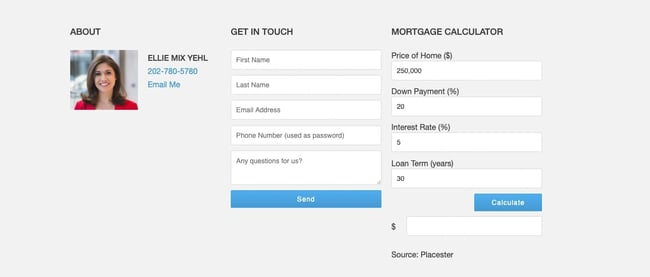
Why this works:
Creating a website provides a digital hub for interested buyers to learn more about available properties. They’ll also be able to learn about your real estate agency or agent who is representing them.
Pro tip: Whether you work at a brokerage or have your own firm, creating a website is a great way to grow your personal brand, show positive reviews from clients you’ve helped, and continue bringing in more qualified leads.
2. Build a blog.
You can also start a blog and create content optimized for SEO. This ensures your posts show up in prospect search results every time. Tools like Google Analytics and Ahrefs can help you find the search terms and keywords your target clients are looking for and will inspire you with fresh topic ideas.
Make it easy for them to navigate to your main website and link to your profile pages on other real estate sites so they can learn more about you and your business.
And don't forget to create interesting images for your posts. This infographic would make a great addition to any blog post or email marketing campaign.
Why this works:
A blog allows you to demonstrate industry expertise, establishing credibility with potential clients. Blogs also create an outlet for sharing industry news, events, and advice for potential clients. You can stay top of mind for your audience, so they think of you when it's time to buy.
Best for: New real estate agents looking to build credibility and trust within their community while they grow their client base.
3. Develop email marketing campaigns.
Send a monthly newsletter roundup of your blog content, and reach out to contacts when new property listings are available. Include images of the properties that link to the full listing, a video walkthrough of the property, or a virtual staging of the home.
Why this works:
Creating email marketing campaigns lets you connect with past and potential clients in real estate marketing. By keeping in touch, agents can stay top of mind with their audience, increasing the chances of receiving referrals or securing repeat business.
Pro tip: Add urgency and curiosity to your email subject lines to improve clients' chances of opening your messages. Here are 20 tips to help you write catchy subject lines.
4. Employ virtual staging.
A virtual staging website gives buyers a sneak preview of what the home looks like. Online staging saves you the time and money of physically staging the property.
A 2023 study found 85% of staged homes sold for 5-23% more than unstaged homes. Virtual staging makes the decoration process easy.
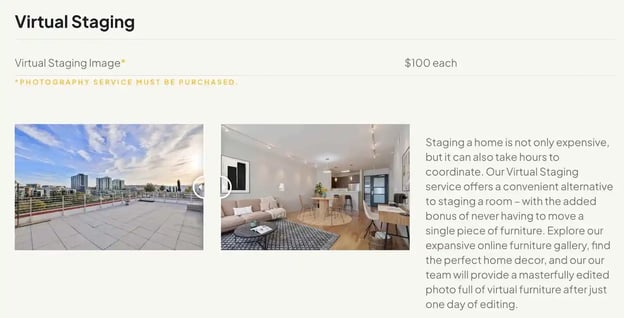
Why this works:
Virtual buyers can envision themselves in a potential new home before visiting the property. By presenting a virtual representation of a furnished property, they can better understand how to use the space and what it would look like if they lived there.
What we like: In the post-pandemic world, virtual staging can be beneficial, whether you’re working on behalf of buyers or sellers, by bringing open houses online.
5. Try experiential marketing.
Experiential marketing engages your prospects and “invites an audience to interact with a business in a real-world situation.” Host a tour of the area you’re selling in, hold an event to teach about buying a home, or arrange an open house.
Why this works:
Experiential marketing brings a real estate agent's brand to life through immersive experiences, making it an effective strategy in real estate marketing. Buyers can then fully engage with the property listings, resulting in deeper connections and higher conversion rates.
Pro tip: With more than 3 million active real estate licensees in the U.S. today, using unique marketing tactics can help you stand out from the rest and build personal connections within your community.
.png)
Free Real Estate Planning Template
Use this free template to plan the marketing, sales, and growth for your real estate business.
- Company Overview
- Territory Overview
- Market Penetration Strategy
- And more!
6. Partner with local businesses.
Use your local connections and partner with clothing boutiques, home decor showrooms, and coffee shops to promote listings — and invite them to participate in an open house event. For a unique way to encourage prospects to visit your open house, set up pop-up shops in different rooms.
Why this works:
Local partnership popups encourage potential buyers to explore each room, and you can work with local businesses to determine discounts on goods that can be offered to home buyers. Plus, you can showcase businesses in the area, making the neighborhood more appealing.
What we like: Building brand recognition with popular local businesses can help spread word-of-mouth and drive more referrals from consumers in the area.
7. Run paid Instagram promotion.
Instagram is another tool to get in touch with home buyers, promote your listings, and grow your brand. Your most beautiful images can reach even more people with a paid promotion.
Instagram ads allow you to pick a target audience, budget, post type (e.g., image, video, carousel), and promotion length. And you can use targeted hashtags to ensure posts are presented to the people you’d like to reach.
Why this works:
Paid Instagram promotions allow agents to target their ideal audience with precision. Instagram ads can target specific demographics, ensuring the most relevant audience sees the ad.
Pro tip: Video ads on Instagram or TikTok aren’t just great for promoting listings — they also give you a chance to show your personality and build credibility with potential clients.
8. Use drone photography.
Using drone photography, take sweeping shots of the home’s exterior and surrounding landscape. Purchase a drone or use a drone service, like HouseLens or Sold by Air, to capture the perfect shot.
Use the photos to add an excitement factor to your listings. Video can be used to supplement your virtual tours or walkthroughs and show exterior features like patios and pools.
Don‘t have the drone photography chops to show your clients’ homes in their best light? Services like Drone Base have thousands of experienced photographers around the globe and specialize in both residential and commercial real estate.

Why this works:
Drone shots can add a layer of professionalism and appeal to your listings. They are a great way to give prospective buyers more insight into the property and surrounding areas.
Best for: Properties in beautiful areas.
9. Create a Zillow profile.
With over 188 million monthly viewers, Zillow lets you get your business in front of thousands of new prospects. This resource from Zillow lists the steps to set up your profile.
Why this works:
Your profile allows you to share your listings with a large audience and connect with potential clients, increasing the likelihood of gaining a new buyer.
What we like: Zillow profiles are free and can connect you with a broader audience.
10. Ask for referrals.
Did you know 41% of sellers using a real estate agent found their agent through a referral from friends or family? If you're not asking for referrals, you should be.
Follow up with buyers a few months after they‘ve settled into their new home to ask how they’re doing, and include a referral request in your email.
[Subject line] Does it feel like home yet?
Hello [Buyer's name],
I hope you‘re settling into your beautiful home! You picked a great neighborhood to buy it in, and I’m so happy to have been able to help you through the process.
I enjoyed working with you. If you have any friends or family looking to buy or sell in the area, I‘d love the opportunity to work with them. I’m hosting a happy hour next week to talk with people about the current market.
Feel free to share this event link with anyone you think might be interested: [Insert link to event page]
Regards,
[Your name]
Some realtors will offer to plan a housewarming party for their new homeowners and use the party/guest list to meet with potential buyers.
Why this works:
By simply asking clients if they know anyone in need of real estate services, agents are opening the door to new leads. Further, referrals are often the highest quality leads. They’re already familiar with your work and come with a higher level of trust.
Pro tip: Avoid sounding pushy or overbearing when asking for referrals. A friendly reminder at closing or in follow-up emails can remind clients to send their friends and family your way. And don’t be afraid to send a thank you gift for any referrals you receive.
11. Make your own videos.
It‘s no secret that video can be a powerful tool for realtors. And it doesn’t have to cost thousands.
Whether you go for a highly produced video like the one below with client testimonials or use video software to record a message from your laptop pitching your services to a potential client, video can be a way to set yourself apart from the crowd.
Why this works:
Promotional videos humanize your agency and create an emotional connection with potential clients. By showcasing your unique selling points, you can also differentiate yourself from competitors.
Pro tip: Get the most out of your videos by adding some flair. Interview past clients, show aerial drone footage of your listings, or star in the video yourself. This can be a great way to show off your personality and build trust with potential clients.
.png)
Free Real Estate Planning Template
Use this free template to plan the marketing, sales, and growth for your real estate business.
- Company Overview
- Territory Overview
- Market Penetration Strategy
- And more!
12. Co-host a webinar.
Want to make it easy for potential buyers or sellers in your area to understand the current market? Partner with a local lender, title company, or even your favorite staging service and host a webinar on a topic that interests those considering making a real estate move.
For example, you might team up with a home improvement service to conduct a webinar on the most valuable improvements sellers can make to their homes to boost sales prices. These preferences can differ per state, so this can be valuable information sellers can't find online.

Why this works:
Your webinar hosts can offer unique insights and information on a specific topic, attracting a wider range of potential clients. Additionally, co-hosting a webinar provides a platform for agents to showcase their expertise and put a human face to their brand.
Pro tip: Don’t forget to request opt-ins from anyone wanting to attend your webinar. Having attendees provide their names, email addresses, and other contact information will allow you to follow up with them directly afterward.
13. Collect and display testimonials.
Your satisfied previous clients are an excellent resource for bolstering your credibility and building trust through your real estate marketing. If a sale goes well, touch base with the customers you helped and get a paragraph-long blurb about how helpful you were.
Once you have that content — along with those clients‘ permission to project it — put it on your website, so prospects can understand how well you’ve previously served people in their position.
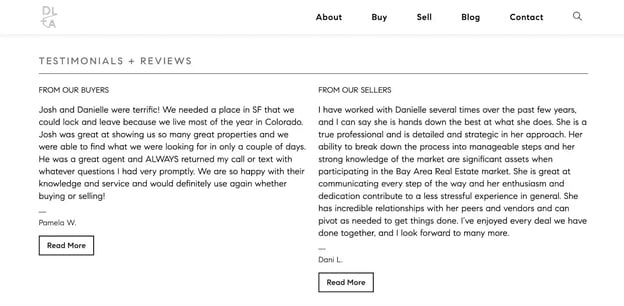
Why this works:
Testimonials build social proof and establish credibility with potential clients. These quotes also highlight the personal experiences and relationships that agents have built with their clients, giving prospects a glimpse into what a partnership looks like.
Best for: Testimonials are one of the best ways to build trust among potential clients, so share them wherever you can: on your website, in your email newsletters, on social media, etc. You can also create video testimonials to amp things up!
14. Leverage traditional advertising media.
While the real estate market hasn‘t been exempt from the rising tide of digital transformation, some old-school marketing tactics can still play into an effective real estate marketing strategy. More traditional media, like print advertisements and billboards, often boost real estate agents’ marketing efforts.
Why this works:
Traditional advertising allows agents to target specific geographic locations, making it an ideal strategy for promoting local property listings. Use this strategy in conjunction with digital marketing to increase brand awareness.
What we like: In today’s digital world, snail mail and other traditional advertising media can help you stand out among your competitors. And research has shown that consumers are more likely to act on print advertising than on digital ads.
15. Optimize your website for mobile.
This point is pertinent for all businesspeople who maintain websites — and real estate agents are no exception. You want your web experience to be as seamless as possible. Prospects shouldn't have to deal with a clunky “desktop condensed onto a phone screen” mobile site when they want to learn more about your business.
Why this works:
Mobile optimization ensures that potential clients can easily view and navigate their listings on any device. Google also prioritizes websites optimized for mobile, as they offer faster loading speeds to potential users.
Pro tip: If building a new website, opt for a template that already has mobile optimization built in.
16. Actively leverage social media profiles.
Maintaining an active, engaging social media presence is one of the better ways to frame yourself as a trusted advisor. Join local Facebook groups, and answer relevant questions that arise on them. You can then take similar strides on other platforms like Twitter and LinkedIn.
You can also share helpful content with your followers. One way or another, establish yourself as an authority in your space by demonstrating that you know what you're talking about.
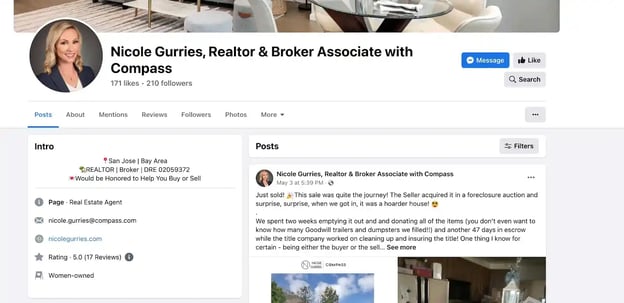
Why this works:
Prospective clients want to connect with real estate agents that understand the practice, their niche, and their areas. A helpful social media presence shows that you have a grasp on all these topics.
Pro tip: If you don’t have the time for social media but have the budget, consider hiring a professional social media marketing manager to help you. They will be versed in creating and analyzing content across multiple platforms and can help you partner with influences to spread your brand even further.
17. Maintain an email newsletter.
One way to keep yourself at the top of potential clients' minds is by staying in active touch via a newsletter. Send them relevant content, report on local real estate news, and update them on listings in their area.
Your newsletter doesn‘t have to be particularly complex or extensive — just enough to keep them thinking of you by letting them know you’re staying up on trends in your local market.
Why this works:
Email newsletters provide a cost-effective way to keep clients informed, engaged, and up-to-date on industry news and trends. By regularly sending out newsletters, agents can nurture leads and build trust with clients.
Best for: Routine newsletters are a great way to keep your name and business top of mind with your clientele, whether they are looking to buy themselves or are referring you to a friend.
18. Create a standout business card.
Printing solid, visually appealing business cards is one of the better ways real estate professionals can get their brands out and demonstrate professionalism.
Why this works:
Business cards are easily distributable and can help you capitalize on in-person interactions with potential clients. They're essentially micro-marketing resources — and serve as instant calls to action for any prospect conversations.
Pro tip: Avoid overcrowding your business cards with too much information or printing them in odd shapes and sizes. Keep them wallet sized with simple, clear, and concise messaging. A little goes a long way.
19. Film video walkthroughs.
Modern consumers are receptive to immersive experiences — especially when getting to know homes they might buy. If you're selling or leasing properties, conducting thorough video tours and posting those clips with your listings can add credibility and intrigue to your real estate marketing.
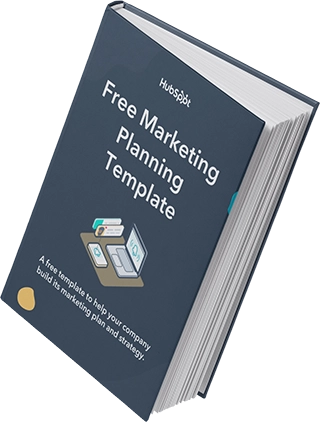
Free Marketing Plan Template
Outline your company's marketing strategy in one simple, coherent plan.
- Pre-Sectioned Template
- Completely Customizable
- Example Prompts
- Professionally Designed
Why this works:
By featuring high-quality video tours of properties, agents can give potential buyers a better understanding of the layout, size, and overall feel of a property.
These tours can also save time for both agents and clients. Prospective buyers can quickly determine if a property is a good fit before requesting an in-person viewing.
Pro tip: Don’t confuse personal videos with virtual walkthroughs. When showing a property, make sure the focus is on the living space and surrounding area. There’s a time to show off your personality and a time to give potential buyers the information they need to feel comfortable making a decision. This is a time for the latter.
20. Invest in branded swag.
People love free stuff — from keychains to mugs to pens to can koozies and beyond — so if you can provide swag like that, you should take it. It's an excellent way to get your brand out and keep your services in mind when attracting and retaining potential clients.
Why this works:
Branded swag provides a tangible reminder of you long after a client has used your services. Plus, your swag can help create a sense of pride and loyalty among employees, who appreciate receiving items that showcase their affiliation with the company.
Pro tip: Don’t waste your money on cheap swag items that will get thrown in the trash, like cheap pens or key chains. If you invest in branded swag, go for something practical or eye-catching, like fun koozies, a nice mug, a stylish tote bag, or quality pens that write well. High-end real estate branding services such as those provided by Proven Partners can help you stand out from the competition.
21. Conduct async home tours.
The housing market has been on fire since 2020, both buyers and sellers expect quick, convenient access to information and solutions. By offering asynchronous home tours via live video, you can give buyers a more immersive experience without requiring them to take the time to physically visit the property.
Why this works:
Virtual home tours save time and effort for both real estate agents and potential buyers. They help buyers to eliminate homes that don't meet their needs without having to visit them in person, and they allow agents to show more homes to more people in less time.
22. Create a city guide.
Moving to a new city can be daunting, especially if you‘re unfamiliar with the area. By creating guides to various cities in the state in which you’re licensed, highlighting the best neighborhoods, local attractions, and top-rated schools, real estate agents can help prospective buyers make more informed decisions about where to live.
Why this works:
Providing detailed information about a city not only helps buyers to make a more informed decision, but it also positions the real estate agent as an expert in the area, which can lead to more referrals and new business.
Pro Tip: Be sure to include your contact information throughout the guide so when buyers see a city they like, they know exactly who to call.
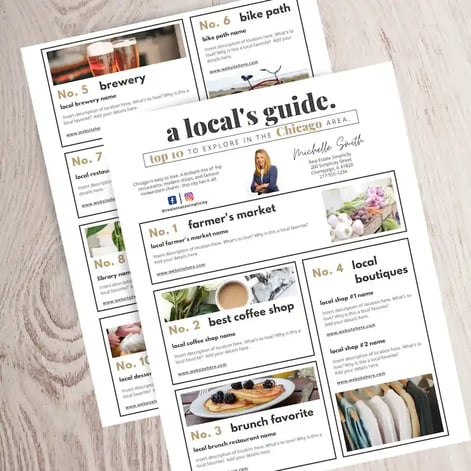
23. Offer an online home decor guide.
A beautifully staged home can significantly increase its appeal to potential buyers. By offering guides for home decorating tips and ideas or using your listings as examples of how to showcase different decor styles, you can help sellers present their home in the best possible light.
Why this works:
Home decor guides provide added value to potential buyers and sellers, while also building the agent's reputation as a trusted adviser and expert in their field.
24. Start a real estate podcast.
Podcasts are a popular medium for consumers to learn, stay informed, and be entertained. By starting a podcast that covers a range of real estate topics, from market trends to advice for first-time buyers, real estate agents can reach a wider audience and establish themselves as thought leaders in the industry.
Why this works:
Podcasts are a great way to establish a personal connection with potential clients. By sharing their expertise and insights in a casual and conversational manner, agents can build credibility and trust with their audience, which can lead to new business.

25. Host home-buying workshops.
Understanding the home buying process can be overwhelming for first-time buyers. By hosting workshops that teach them the basics of buying a home, including how to secure a mortgage, what to look for in a home, and more, real estate agents can educate potential buyers and help them feel more confident in their decision-making.
Why this works:
Workshops provide an opportunity for agents to connect with potential buyers on a deeper level, building trust and rapport while providing valuable information that can lead to future business.
How to Create a Real Estate Marketing Plan [Template]
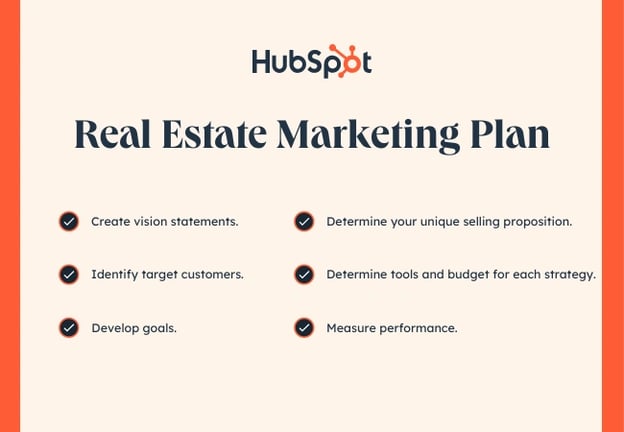
Now that you have some marketing ideas, the next question is, “What’s the plan?” Without clear goals for your real estate business and marketing strategy, measuring success is difficult. Consider the following points when developing your marketing plan.
.png)
Free Real Estate Planning Template
Use this free template to plan the marketing, sales, and growth for your real estate business.
- Company Overview
- Territory Overview
- Market Penetration Strategy
- And more!
1. Create a vision statement.
What do you want to accomplish in the short and long term? Develop a vision statement to identify the goals you’d like to reach. This makes it easier to lay out steps for reaching your business’ vision.
2. Identify your target customer.
Who are you marketing to? Will you be marketing to sellers, renters, first-time home buyers, etc.? Identifying the personas you’re selling to paints a clearer picture of who to target with your marketing efforts.
3. Develop goals.
Set goals for your overall marketing initiatives and summarize which strategies you’ll use to accomplish these goals. What are the business goals you’d like to reach? And what criteria will you use to decide if these goals have been met?
4. Determine your unique selling proposition.
Think about what differentiates you from your competition. Here are some questions you can ask yourself when developing your proposition:
- What can you offer that others can’t?
- How does your unique approach or personality create value for prospects?
- What are your market's latest pricing, selling, and buying trends?
- How can you discuss these trends (including the numbers) with prospects?
5. Determine tools and budget for each strategy.
Pick the top marketing ideas for your business, selling proposition, and ideal target market. From there, calculate how much of your budget to allocate to each strategy.
6. Measure performance.
Once you’ve identified the tools you’ll use to market your business, write down key metrics to measure their success. Determine the timeframe for the strategy or campaign and set a goal. Let’s use a paid Instagram ad as an example:
Campaign: Instagram post promotion
Length of promotion: 3 weeks
Goal: The post should gain 1,000 impressions and have a click-through rate of 1%.
Should I hire a real estate marketer?
That‘s a tricky question. For one, there’s no clear definition of what a “real estate marketer” actually is. Several potential marketing ideas for real estate professionals don‘t need to be allocated to a consultant or third party. For instance, you probably don’t need a marketer to film a quick walkthrough of an apartment.
But often, real estate professionals lack the time, resources, and know-how to assume certain marketing responsibilities — and those can often be outsourced to contractors.
If you're struggling with website design, content creation, graphic design, SEO, or any other technical or creative process beyond your skill set, you might want to bring in some people who can address those issues.
Create your real estate marketing plan.
With these marketing ideas, you’re sure to wow your potential customers and attract them to your services. Creating a marketing plan will help you set goals for your marketing campaigns and develop the steps to reach these goals.
Editor's note: This post was originally published in July 2019 and has been updated for comprehensiveness.
This article was written by a human, but our team uses AI in our editorial process. Check out our full disclosure to learn more about how we use AI.


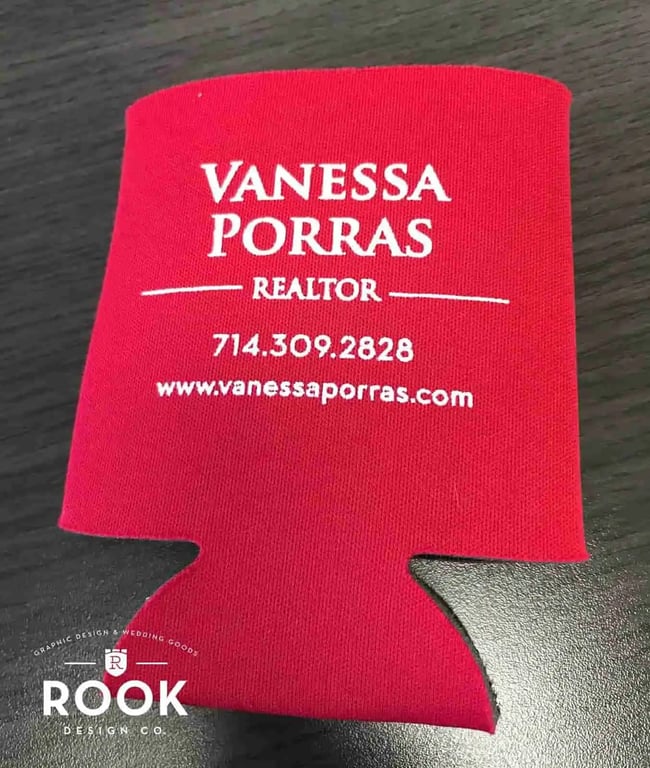
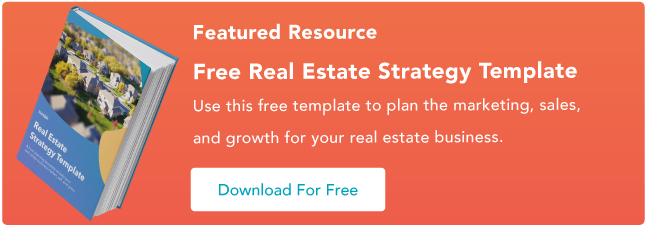
![20 Impressive Examples of Realtor Bios That Win Clients [Template & Examples]](https://blog.hubspot.com/hubfs/realtor-bio_14.webp)


.jpg)
.jpg)

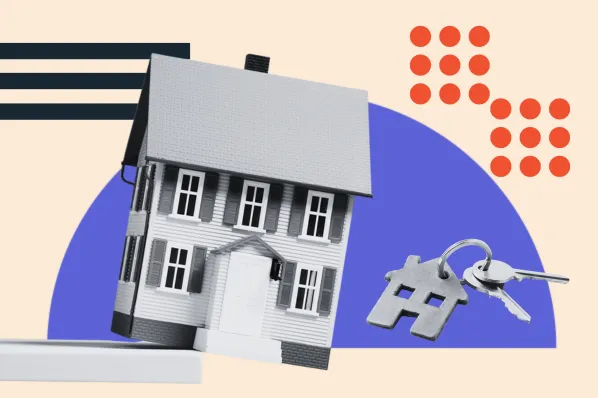
.png)

